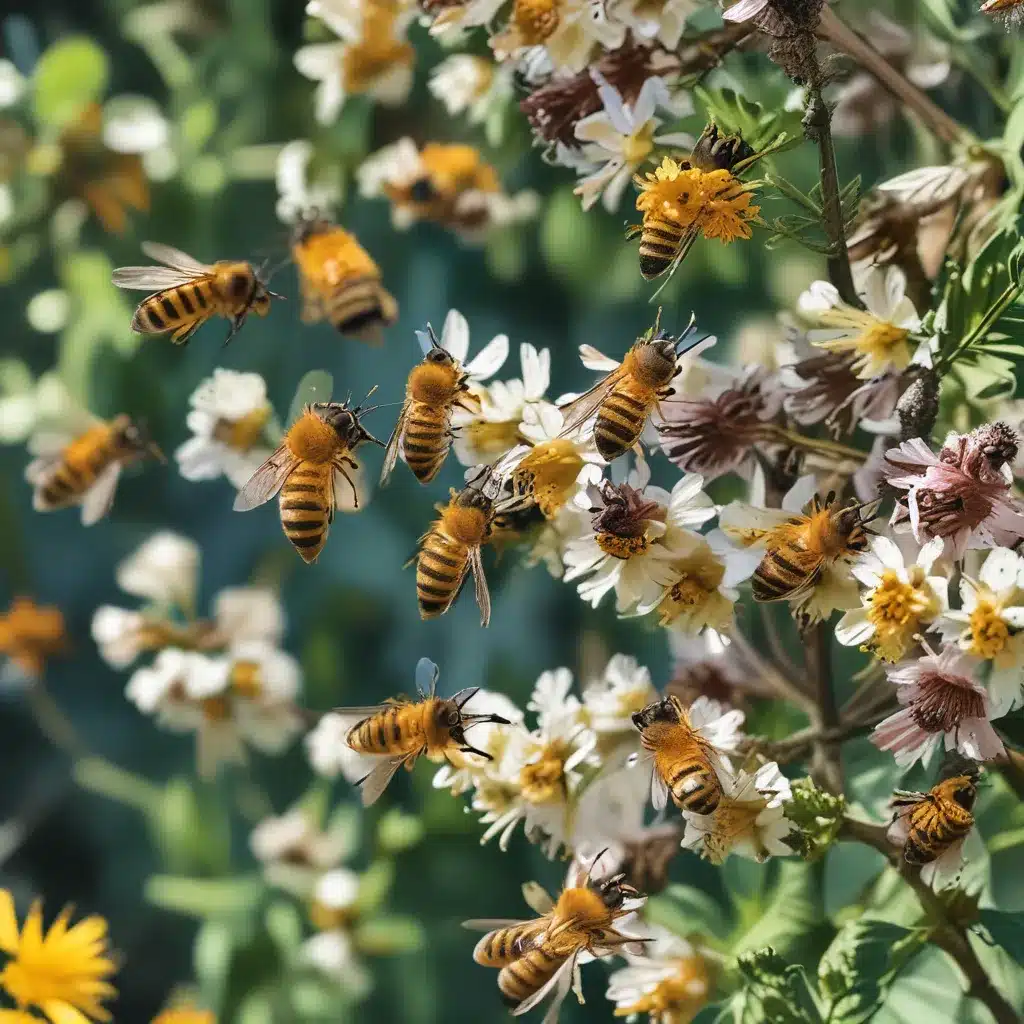
A Buzz-Worthy Adventure Awaits
As I step into my backyard, the air is alive with a symphony of buzzing wings. Bees dart from flower to flower, their industrious movements a testament to the vital role they play in the intricate web of life. As a member of the Thornapple CSA, I’ve long been fascinated by the pollinators that help nourish our bountiful garden. And now, I’m embarking on a new adventure – backyard beekeeping.
The Importance of Pollinators
Pollination is the lifeblood of our agricultural system. As the Mass Audubon website explains, pollinators like bees, butterflies, and even some birds and bats are responsible for helping plants reproduce by spreading pollen among flowers. Without these tireless workers, we’d be hard-pressed to enjoy the vibrant array of fruits and vegetables that grace our tables.
But the truth is, many of our beloved pollinators are facing a crisis. Populations of native bees and other pollinators are threatened by climate change, pesticide exposure, habitat degradation, and other factors. As gardeners and CSA members, we have a responsibility to do our part in fostering healthy pollinator populations.
The Joys of Backyard Beekeeping
That’s where backyard beekeeping comes into play. Now, I know what you’re thinking – “Bees? In my backyard? Aren’t they, you know, dangerous?” Well, let me tell you, the rewards of keeping your own beehive far outweigh the risks. Plus, with a little knowledge and preparation, you’ll be safely tending to your buzzing brood in no time.
The Basics of Beekeeping
The first step is to do your research. Luckily, there’s a wealth of information out there to guide aspiring beekeepers. Ecological Gardening has a great overview of the differences between “city bees” and “country bees”, which can help you determine the best fit for your backyard setup.
Once you’ve chosen your hive location and acquired the necessary equipment, it’s time to welcome your new insect neighbors. Bees are generally quite docile, especially when they’re focused on their vital work. With a little care and attention, you’ll be able to observe their intricate social structure and witness the magic of pollination up close.
The Sweet Rewards of Honey
Of course, one of the most exciting perks of beekeeping is the prospect of harvesting your own honey. Imagine the satisfaction of spreading a spoonful of liquid gold from your very own backyard on your morning toast or drizzling it over a fresh fruit salad. Not only is homemade honey downright delicious, but it’s also a testament to the hard work and dedication of your bee colony.
Fostering a Healthy Ecosystem
But the benefits of backyard beekeeping extend far beyond the sweet stuff. By providing a safe haven for these essential pollinators, you’re actively contributing to the health of your local ecosystem. As the Mass Audubon website points out, pollinators don’t just help plants – they rely on the rewards plants provide to survive and reproduce. Your backyard beehive becomes a vital link in the chain, supporting a diverse array of flora and fauna.
Creating a Pollinator-Friendly Garden
Of course, beekeeping is just one piece of the puzzle. To truly foster a thriving pollinator population in your CSA garden, you’ll need to consider the broader landscape. Fortunately, there are plenty of simple steps you can take to make your backyard a pollinator paradise.
Planting for Pollinators
The first and most obvious step is to fill your garden with native, nectar-rich plants. Milkweed, for example, is a crucial host plant for monarch butterflies, while flowers like columbine and cardinal flower provide a bounty of nectar for hummingbirds and other winged visitors.
But it’s not just about the flowers. Don’t forget to leave a few patches of bare ground for ground-nesting bees, and consider incorporating a small water source, such as a birdbath or shallow dish, to quench their thirst.
Reducing Pesticide Use
Another important step is to reduce your reliance on synthetic pesticides. While these chemicals may seem like a quick fix for pesky pests, they can have devastating effects on pollinator populations. Many native bees and other beneficial insects are experiencing dramatic declines due to pesticide exposure, so it’s crucial that we find more eco-friendly solutions.
Instead, consider embracing the power of integrated pest management (IPM) techniques, such as introducing predatory insects or using organic deterrents. Your CSA garden will thank you, and your pollinator friends will thrive.
The Ripple Effect of Backyard Beekeeping
As I reflect on my journey into the world of backyard beekeeping, I can’t help but feel a sense of pride and purpose. By tending to my own hive, I’m not just reaping the sweet rewards of honey – I’m playing a vital role in supporting the delicate balance of our local ecosystem.
And the best part? The positive impact of my backyard beekeeping efforts doesn’t stop there. As the USDA’s Climate Hubs website points out, urban agriculture initiatives like community-supported agriculture (CSA) can have far-reaching benefits for the environment and our communities. When we work together to foster healthy pollinator populations, we’re not just helping our own gardens – we’re contributing to a more sustainable, resilient food system for all.
So, if you’re a fellow CSA member, or simply someone who cares about the health of our planet, I encourage you to consider taking the plunge into backyard beekeeping. It may just be the start of a buzz-worthy adventure that will leave a lasting impact on your community and the world around you.



